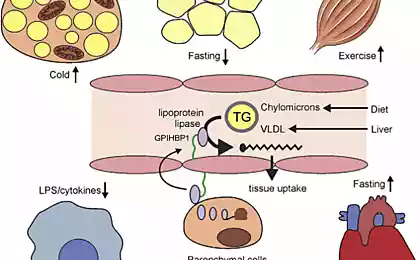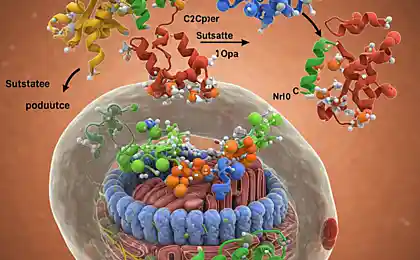178
Healthy Habits: 15 Daily Activities That Will Prolong Your Life

Introduction. When it comes to longevity, most of us think about genetic factors or the complex medical research that will someday unlock the elixir of life. But scientists and doctors are increasingly pointing out that the key to a long and fulfilling life lies in the simple daily habits that shape our way of life. From moderate physical activity to a balanced diet, a set of seemingly minor actions taken day after day can have a huge impact on overall health and well-being. In this article, we will look at fifteen activities that will not only make you healthier, but also, according to a number of scientific studies, can extend your life by years.
1. Morning exercises or light gymnastics
Many people underestimate the benefits of a short warm-up in the morning, preferring extra minutes of sleep. Meanwhile, just 5-10 minutes of light exercise is a great way to wake up your body and brain. Studies (NCBI) confirm that even short-term exercise improves blood circulation, saturates cells with oxygen and increases overall tone, helping to concentrate better in the morning.
- Council: Try basic exercises - head rotations, bends, swinging arms and legs, light squats. Regularity matters more than intensity.
2. A glass of water immediately after waking up
During the night, the body loses a lot of fluids (through breathing, sweating), and morning water helps to make up for this deficiency. In addition, it accelerates metabolism and has a positive effect on the digestive system.
- Council: Some experts recommend adding a couple of drops of lemon juice to the water to additionally “start” the metabolism.
3. Conscious eating and portion control
Sometimes the problem is not that we eat junk food, but that we eat too much. Particular attention should be paid to portions and a conscious attitude to eating. If you eat slowly, enjoying the taste of each piece, the signal of satiety will arrive on time and you will not overeat.
- Council: During the day, it is better to make several small meals than one or two, but voluminous.
- Fact: Studies show that people who observe the principle of mindfulness in nutrition are less likely to experience obesity and metabolic syndrome.
4. Sleep mode: at least 7-8 hours a day
Lack of sleep leads to increased stress levels, cognitive decline and even weight gain. Constant lack of sleep weakens the immune system, increasing the risk of various diseases. Properly organized sleep is the basis for the restoration of all body systems.
- Council: An hour before bedtime, put down all the gadgets, as the blue light of the screen suppresses the production of melatonin.
5. Walking and abandoning the elevator
Physical activity is one of the most reliable ways to strengthen the cardiovascular system and increase life expectancy. If you constantly use the elevator, try climbing stairs at least a couple times a day. Instead of a short-distance bus, choose a walk.
- Fact: According to the WHO, regular walking for 30 minutes a day reduces the risk of cardiovascular disease by 20-30%.

6. Eating fruits and vegetables at every meal
Plant foods are rich in fiber, vitamins, minerals and antioxidants that protect the body’s cells from oxidative stress. It is antioxidants that prevent premature aging and help reduce the risk of chronic diseases.
- Council: Try to make at least half of your plate consist of vegetables of different colors: green, red, orange.
7. Regular warm-ups for the eyes
In the digital age, vision often suffers from constant eye strain when working at a computer or using a smartphone. A simple exercise of taking your eyes off the screen every 20 minutes and looking into the distance for 20 seconds can significantly reduce the risk of digital eye fatigue.
- Fact: According to the American Optometric Association, computer vision syndrome (CVS) affects up to 90% of office workers, but “vision breaks” can reduce the likelihood of developing it.
8. Meditation or at least a few minutes of silence
Stress and emotional stress of the modern world often lead to depression, anxiety and general decline. Meditation and mindfulness practices are powerful tools to help maintain inner balance and strengthen the nervous system. Even 5-10 minutes a day, spent in silence with your eyes closed and focusing on breathing, bring noticeable results.
- Council: If classical meditation doesn’t suit you, try replacing it with a quiet walk in the park without music or phone calls.
9. Maintaining healthy levels of hydration
In addition to a morning glass of water, it is important to ensure that the body does not experience fluid deficiency during the day. Water is involved in all metabolic processes and contributes to the elimination of toxins.
- Council: Carry a small bottle of water with you and teach yourself to periodically take a couple of sips from it.
10. Take short breaks from work
Monotony and a long stay in one position (for example, at the desktop) negatively affect posture, vision, attention and mood. A short break every 1-1.5 hours is a great opportunity to warm up, drink water and ventilate the brain.
- Fact: Studies show that people who take short breaks work more efficiently and experience burnout less often.
11. Supporting social networks
A person is important not only physical, but also emotional aspects of health. Regular meetings with friends, socializing in the family, participating in volunteer projects – all this strengthens the sense of belonging and reduces stress.
- Council: Try to allocate time in the schedule for friendly gatherings or calls, if there is no opportunity to meet in person.
12. Timely medical checks
Preventive examinations and regular health monitoring help to identify various problems at an early stage and solve them in time. A blood test, a dental examination, and a vision test may all seem routine, but ignoring such procedures often leads to serious consequences.
- Fact: Early detection of diseases increases the likelihood of successful treatment dozens of times.
13. Limiting sugar and ultra-processed foods
Excess sugar is associated with an increased risk of obesity, diabetes and cardiovascular disease. Excessive consumption of ultraprocessed products (chips, soda, fast food) also has a negative effect on the body, increasing the level of inflammatory processes.
- Council: Instead of sweets and sweets, choose fruits or natural nuts. Try to cook your own food, avoiding added flavor enhancers and dyes.

14. Self-education and reading
To maintain brain health, it is important to continuously expand your horizons and train cognitive functions. Reading books, participating in thematic forums, studying new areas of knowledge has a beneficial effect on the psyche and contributes to active longevity.
- Fact: Cognitive activity (such as learning new skills) is associated with a reduced risk of age-related memory impairment, including Alzheimer’s disease.
15. Gratitude and positive attitude
Regular expression of gratitude, even for small joys, changes the perception of life in the direction of positive. People who have a habit of seeing the good are less likely to suffer from depression and cope better with stress.
- Council: Keep a gratitude journal – write down 2-3 moments a day for which you are sincerely grateful to fate or others.
Conclusion
Each of these habits may seem insignificant, but together they form a holistic system that supports both physical and mental health. Regular exercise, adequate water intake, mindful eating, time for emotions and social connections are not magical rituals, but proven scientific actions that together can literally prolong life. Remember that longevity is not only the number of years, but also their quality, fullness, feeling of vitality and interest in the world around.
Habits don’t change overnight, but the gradual integration of even a few items from the list can make you feel better soon. Start small – a glass of water in the morning, a walk instead of an elevator, an extra portion of vegetables at dinner. Gradually accustom yourself to a deeper concern for your body and mind. Eventually, you’ll find that these seemingly simple things can become the foundation for an active, happy, and long life.
Where money goes: 9 habits that lead to poverty
How Smart People Talk to People They Don't Like: 8 Wise Principles























